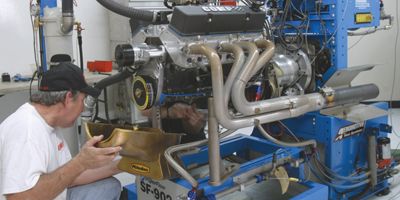
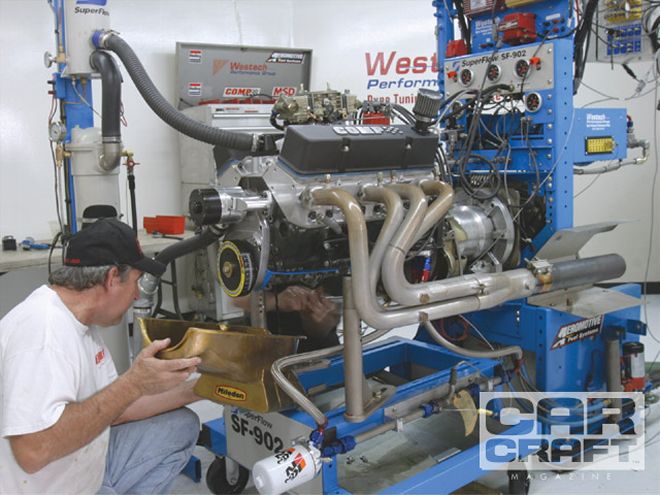 After changing four oil pumps in one day, we really have to thank the unsung Chevy engineer who first developed the one-piece oil pan gasket. The Dart SHP, one-piece rear main seal engine and Fel-Pro gasket made these pan swaps much less painful.
After changing four oil pumps in one day, we really have to thank the unsung Chevy engineer who first developed the one-piece oil pan gasket. The Dart SHP, one-piece rear main seal engine and Fel-Pro gasket made these pan swaps much less painful.
While everybody knows what the oil pump's job is and why it's there, few enthusiasts consider the lowly bubbler as a possible engine tuning resource. We've come to appreciate that it takes power to pump that oil, and as lubricants have improved over the last 10 years, we needed to know more about pressure, volume, and viscosity. Westech's Steve Brule proposed a flogging of four Milodon small-block Chevy oil pumps on a 372ci small-block Chevy. While somewhat mild, this small-block cranked out nearly 500 hp through two grueling dyno days of constant flogging with never a whimper. Even more impressive was the small-block's excellent consistency. If you're looking for a rock-solid small-block crate engine, the SHP is an excellent choice.
What we learned was that while there are not huge differences in terms of power, there are areas where small improvements can be realized with a careful approach to the combination of pressure, volume, and oil viscosity. Our tests showed us that big-volume, high-pressure pumps of years past may not be the hot ticket for all street engines. If after you read this story it suggests that 80- to 90-psi oil pressures that backyard engine builders used to brag about are now about as useful as last month's pine tree air freshener, then we've done our job.
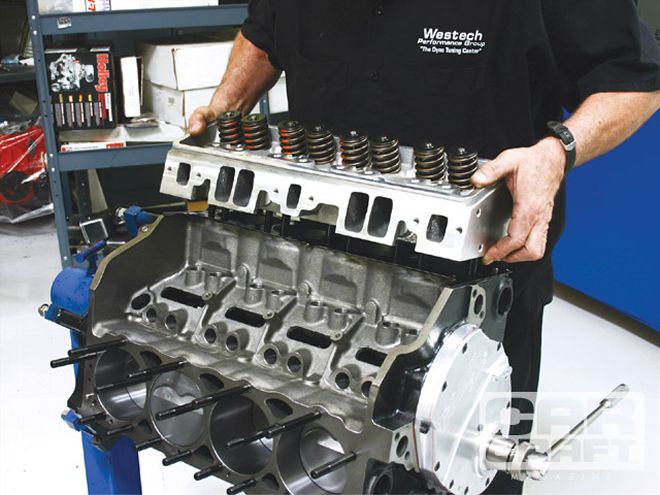 The Dart SHP short-block came preassembled, which made bolting together the rest of the engine easy once Brule degreed the cam and verified the piston-to-valve clearance.
The Dart SHP short-block came preassembled, which made bolting together the rest of the engine easy once Brule degreed the cam and verified the piston-to-valve clearance.
Our Test Mule
A small-block Chevy seemed the perfect engine for this oil flogging, so Westech assembled a great test engine that started out as a Dart Special High Performance (SHP) 372ci iron-block short-block assembly. Instead of using the typical 383 approach, Steve Brule at Westech selected a big-bore/shorter-stroke combo consisting of a 4.125-inch bore and a 3.48-inch stroke. The Dart SHP short-block came assembled with a set of flat-top hypereutectic pistons and a cast crank. On top of this, we added a set of Dart Pro 1, 200cc intake port aluminum heads and a Comp XR294 hydraulic roller camshaft. The baseline testing on this engine pushed the peak torque up to almost 450 lb-ft at 5,100 rpm and peak horsepower to around 477.
Oil Pump Test
With the engine ready to go, Westech fitted the dyno with an extremely accurate oil flow meter that was located in line with a relocated K&N oil filter. We first compared flow rates with and without the K&N oil filter to determine what kind of restriction it represented. The flow changed an average of 0.2 gallon per minute with straight Lucas 30W oil, or slightly more than 3 percent, which we felt was not going to affect our testing. This first test also established the procedure where each test started within 1 degree of the same oil and water temperature every time to maintain testing accuracy, since oil and water temperature have a big impact on engine performance. Brule also wanted to ensure that ignition timing would not change with all the different pumps, so the distributor was never moved. This required Brule to snuggle up to a hot engine while dodging the Lucas equivalent of a 30W rainstorm.
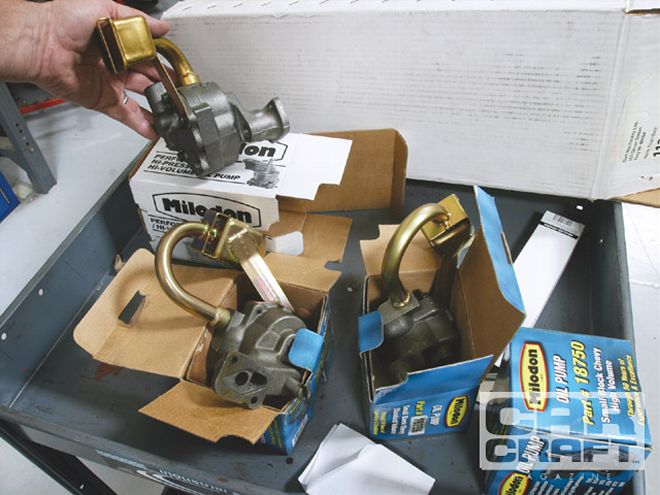 We tested four different Milodon small-block oil pumps, from a stone-stock piece to a high-pressure, high-volume Rat motor unit. The two largest-volume pumps also employed larger 3/4-inch-diameter pickup tubes with 5/8-inch tubes for the smaller pumps.
We tested four different Milodon small-block oil pumps, from a stone-stock piece to a high-pressure, high-volume Rat motor unit. The two largest-volume pumps also employed larger 3/4-inch-diameter pickup tubes with 5/8-inch tubes for the smaller pumps.
Once Brule waded through all four pumps, the results followed a somewhat predictable path. Most surprising, however, was the performance of the stock pump. The plain Jane version not only high-fived the horsepower race but also (to no one's surprise) achieved the lowest pressure. The stock pump's pressure curve was also the opposite of the rest of the high-volume pumps. Given more time, it would have been interesting to modify this pump by adding a small washer to the pressure-relief spring, which may have improved the pressure curve slightly without compromising power. Another surprising result was that the big-block pump was not the big power loser we had predicted. The Rat pump did produce the highest average pressure but managed to require slightly less horsepower compared with the high-volume small-block pump.
It's also normal to see that as oil pressure increases, volume decreases. But in this case, the pump size changed. The variable between the stock, high-volume small-block and big-block pumps is we were testing increasingly larger pumps. It might also be suggested that the larger big-block pump with its greater number of gear teeth might create a more stable pressure curve that increases flow without having to work nearly as hard. This would minimize the temperature rise. The greater number of pump teeth would also help stabilize pressure. We also considered reducing the pressure on a big-block pump to see if that might improve its performance, and what would happen if we combined those changes with a less viscous oil like the 5W-20. As usual, it seems our test created almost as many questions as it answered. We didn't really expect to see major power differences, but it was surprising to see how well the big-block pump performed compared with its small-block brethren.
Click here for the oil pump test results chart
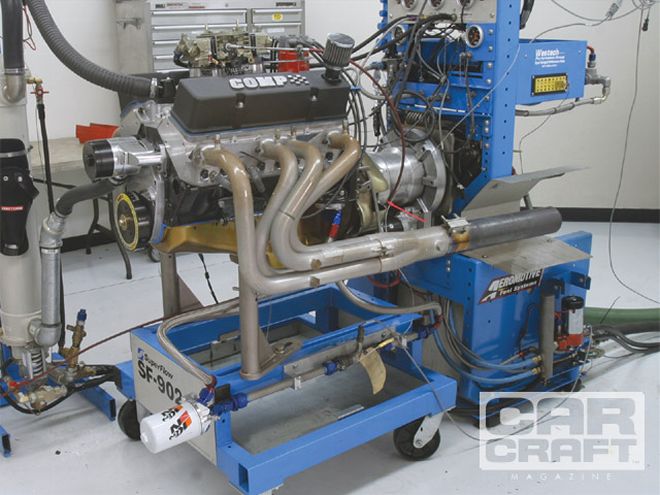 Final engine accoutrements included a Weiand Stealth Air Strike intake and a Holley 950-cfm HP Ultra carburetor. To keep the testing simple, exhaust duties fell to a set of 17/8-inch Hedman headers with 18-inch collector extensions without mufflers.
Final engine accoutrements included a Weiand Stealth Air Strike intake and a Holley 950-cfm HP Ultra carburetor. To keep the testing simple, exhaust duties fell to a set of 17/8-inch Hedman headers with 18-inch collector extensions without mufflers.
Oil Viscosity Test
For the second part of this lubrication lesson, we left the high-volume small-block pump in place and tried five different viscosities of oil just to see what would happen. Again, Lucas Oil supplied the slippery stuff, and the results were interesting even if they performed pretty much the way we expected. We retested the engine with a volume of 5 quarts of Lucas straight 30W petroleum-based oil to use as the standard followed by two street-oriented synthetics-20W-50 and 5W-20-and two exotic and very thin Pro Stock blends-0W-20 and 0W-10. After each test, the oil was drained from the pan and the filter. This meant a small amount of the previous test's oil remained in the filter, but we decided that it would have minimal effect on the test.
When looking strictly at power, we expected the heaviest 20W-50 weight oil to be the worst horsepower thief, so we were surprised when the straight 30W oil made the least power. This may be because it was also the only nonsynthetic tested. The chart shows that while the peak horsepower numbers changed slightly, the differences were far more apparent when we averaged the horsepower across the entire rpm band from 3,100 to 6,500 rpm. If you look only at peak or average power, it's important to note that the synthetics are clearly better than a straight weight, even with a more viscous oil like 20W-50. Comparing the 30W with the 0W-20 in terms of average power, the difference is 3.6 hp per rpm point. While that may not sound like much, with a properly tuned drag race car, it might be measureable on the dragstrip. Also notice that even though the 0W-10 outperformed the 0W-20 at the peak by 2 hp, the average was virtually a tie. Lucas says these Pro Stock race oil blends are really designed for 9,000-rpm race engines that begin to load parts pretty hard at rpm levels that our test never came close to seeing. Based strictly on horsepower, it appears from this test that a 5W-20 synthetic might be the best compromise among power, oil flow, and pressure.
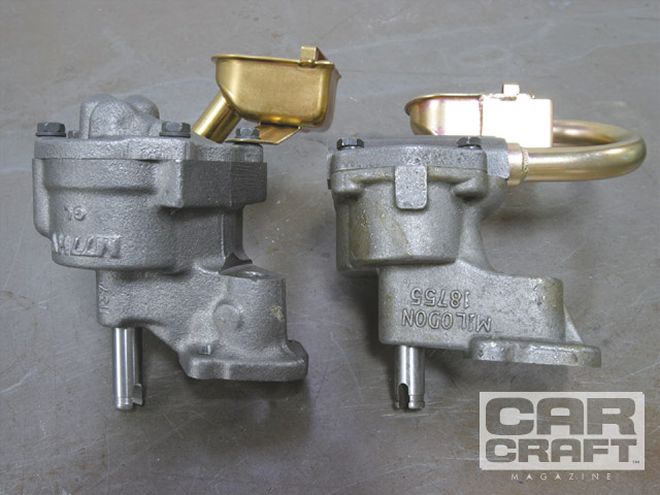 It's also easy to see the differences in capacity in this photo of the two pump bodies with the stock-style small-block pump on the right and the big-block pump on the left.
It's also easy to see the differences in capacity in this photo of the two pump bodies with the stock-style small-block pump on the right and the big-block pump on the left.
Note also how the relationship between oil flow and oil pressure remained consistent in that as pressure increased, flow decreased or as flow increased, pressure decreased. As an example, the average pressure dropped more than 11 psi between the 30W and the 0W-10, while the average flow increased from 6.1 to 7.4 gallons per minute. That's a 21 percent increase in volume between the lightweight oils and the straight 30W. In fact, all three of the lightest oils flowed dramatically more than the straight 30W. It bears emphasizing that oil flow (while more difficult to measure) is actually more important than pressure in terms of engine life. Oil flow with some pressure behind it is far superior to low oil volume with lots of pressure behind it. Perhaps the biggest surprise was that the 20W-50 synthetic performed as well as it did against the lighter oils. The biggest differential compared with the 0W-20 is in flow, where the 20W-50 lost almost 14 percent. This is understandable when accounting for oil pressure, since the 20W-50 produced the highest average at 67.4 psi compared with 0W-20's much lower 59.7. That's well over a 10 percent difference. If an average oil pressure of roughly 60 psi doesn't bother you (and it shouldn't for a small-block Chevy), then it appears the 5W-20 would be a good overall choice offering excellent flow and the very good average power with acceptable temperature.
Click here for the oil viscosity test results chart
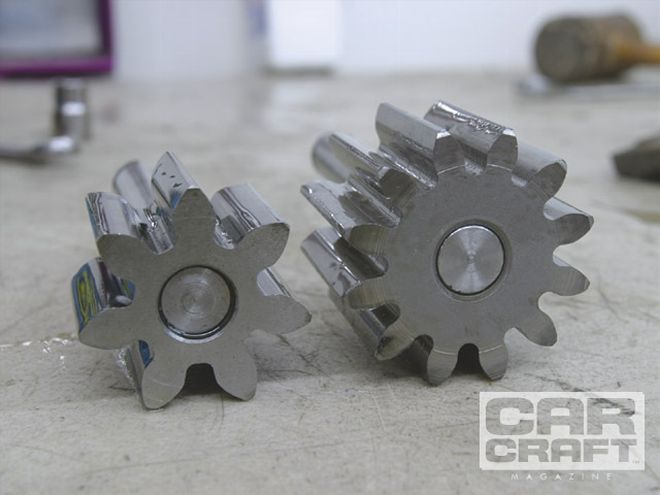
In this comparison, you can see the major difference between a high-volume small-block pump gear (left) and the Rat motor gear (right). The Rat motor pump enjoys a larger diameter and more pump teeth that should create a more stable output curve.
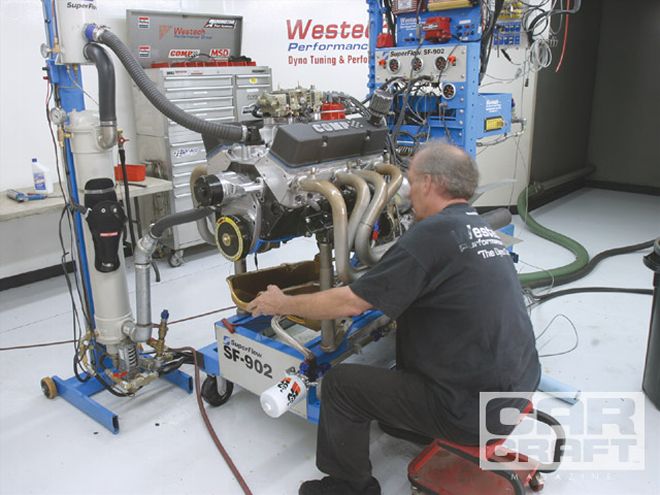
By the time Brule attacked the fourth pump, he had the swap down to about 20 minutes. We also maintained the exact same volume of oil for each test to ensure an accurate test.
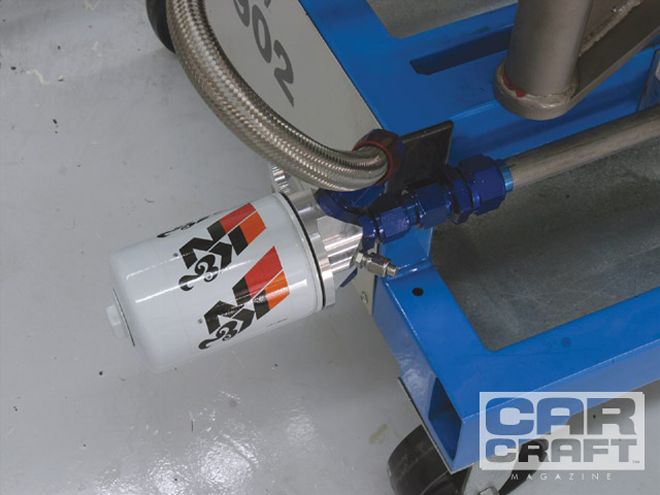
All tests were performed using a K&N oil filter that our testing revealed had a very low flow restriction. The case thickness is also much greater than regular oil filters.
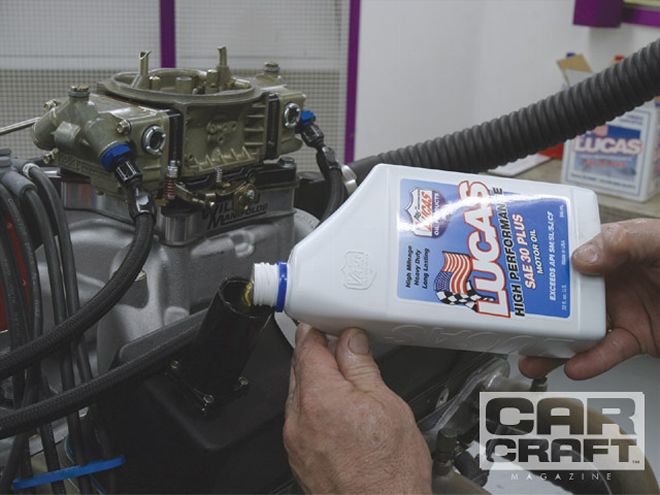
We used Lucas oil for all the testing. The 30W was the only nonsynthetic we tested. From the testing, it appears the 5W-20 might be a good choice for a performance street engine.